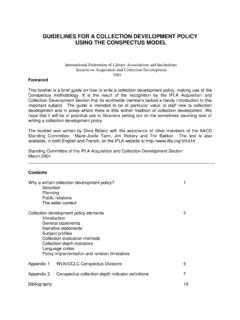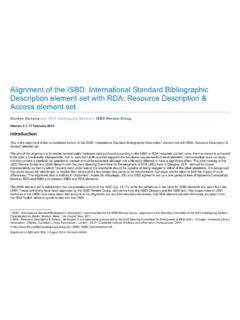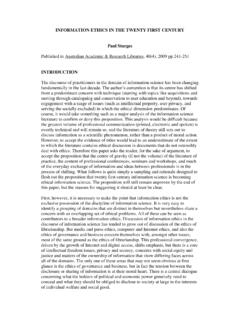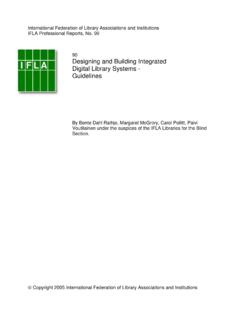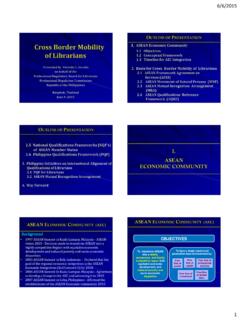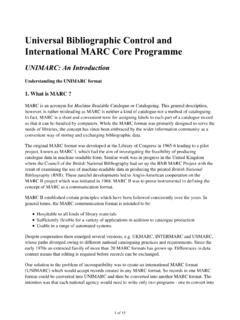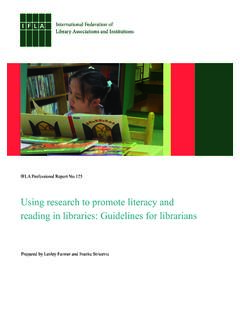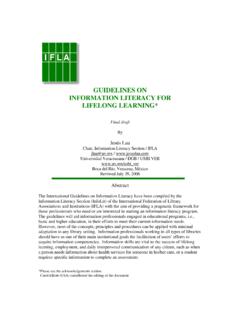Transcription of Local studies centers: transforming history, culture and ...
1 Date submitted: 31 May 2012. Local studies centers: transforming history, culture and heritage in the Philippines IFLA LIS Student Paper Award 2012. Martin Julius V. Perez School of Library and Information studies University of the Philippines, Diliman, Quezon City, Philippines &. Librarian Far Eastern University Manila, Philippines Email: Mariel R. Templanza School of Library and Information studies University of the Philippines, Diliman Quezon City, Philippines &. Librarian Manila Observatory Library and Archives Quezon City, Philippines Email: Session: 180 Innovative libraries: transforming our communities Asia and Oceania Abstract: Purpose of this paper: This paper is an exploratory study of the specialized information centers in the Philippines referred to as Local studies centers. Local studies centers combine a library, an archives and a museum as one, in terms of the range of the collections, and serve one purpose of preservation of knowledge, history, culture and studies about a certain locality defined in all facets.
2 It aims to identify and describe the nature, practices and status of these Local studies centers and to explore the innovative and transformative role of these Local studies centers in the fields of history, culture and heritage studies in the Philippines. This paper specifically examines the impact of their programs, projects, services, and activities on the study, development and promotion of the three above said fields. Design/methodology/approach: The qualitative - descriptive type of research method were employed in this study. Literature reviews, ocular visits, and case studies were conducted in the Local studies center that were the subject of this study: Local studies centers found in three regions in the Philippines, namely: Central Luzon, CALABARZON and MIMAROPA Regions. Findings: The findings reveal the common and unique characteristics of Local studies centers in the Philippines.
3 It also reveals which programs, projects, services and activities of these Local studies centers have beneficial impacts in the development and advancement of the fields of history, culture and heritage studies in the Philippines. This study elicits three outstanding features of Local studies centers in the Philippines: 1) they collect materials pertaining to ethnic groups, and make the materials available and accessible to potential users, mostly, in one center, 2) their holdings include library materials, archives and museum artifacts, and 3) they conduct researches and publish books, relating to history, culture and heritage of the localities they serve and the Philippines. Practical implications: This paper may provide insights for the management (or future establishment) of Local studies centers not just in the Philippines, but also in other countries. It will also highlight and study their unexplored role in the fields of history, culture , and heritage studies .
4 Since Local studies centers take part in the creation, repackaging, publishing, storage, dissemination and preservation of knowledge, information, culture and heritage, it is important to study them to further improve their management and development as knowledge generators and repositories. What is original/value of this paper: This is the pioneer study that explores the nature, practices and status of established Local studies centers in the Philippines. Through examining their programs, projects, services and activities, this study will shed light on the role of Local studies centers in the fields of history, culture and heritage studies , and as well information science. Keywords: Philippines, Local studies centers, history, culture , heritage, Local studies Introduction People create information every day, seven days a week. At this day and age, people have witnessed how our society has evolved when it comes to information.
5 Information is therefore essential to survival in our present communities. One way that contributes to the enlightenment of these communities, is through their search for information and knowledge on what happened, what is happening and what will happen in their surroundings. Thus, one of the principal interests of an enlightened or informed community is the study of Local history (Hobbs, 1962). The field of Local history is subsumed with importance, as active interest on it rises. Undoubtedly, one of the contributory factors to the rise of this active interest, as suggested in 1959 by Hoskins (cited by Hobbs, 1962), is that people become more inclined to study something of which they can reach, easily grasp of, and can find a personal and individual meaning. This personal and individual meaning may include the experiences and chronicles of these people, or the events and happenings in the locality they belong to.
6 This is in general part of the story of what we so called the Local history. Mibolos (1998). attributed Local history to the collective experiences of a certain group of people. The approaches on Local history changed through time. The Local history before, is limited only into three approaches. These include: 1) the attempt to discuss Local history as a subject reflected of national events, resulting in a catalogue of Local occurrence; 2) the study of particular records, such as churchwardens accounts, resulting in a concentration upon curiosa rather than essentials; and lastly, 3) the determined and scientific collection of facts from many and varied sources which resulted in the best of the 18th and 19th century Local histories (Hobbs, 1962, ). Currently, people expand their interest to study further something that they can easily understand and relate with, leading the field of Local history to a new approach of attempting to study the growth and development of the locality including its institutions and all its manifold aspects.
7 This is done through field work, co-operative study, examination of original records, and rewriting of social and economic history. In this manner, the study of Local sources adds to the knowledge of the mentioned subject (Hobbs, 1962). The expanded interest in Local history is then transformed into a wider and deeper sense, introducing the birth of Local studies . The term, Local studies , covers the Local environment in all its physical aspects, including geology, paleontology, climatology and natural history, and in terms of all human activity within that environment, past, present and future (Martin et al., 2002, ). Local studies do not only cover the Local history and the past, but rather includes the present and future information about a locality. While the concept of information, specifically Local studies , changes from time to time, the concept of treating these information changes as well.
8 Not only libraries are involved in this paradigm shift but also other institutions such as museums and archives, and later on the Local studies centers. Research Questions The primary concern of this study is to identify and describe the nature, practices and status, with emphasis on programs, projects and services, of Local studies centers in the Philippines.. Specifically, the following research questions were investigated: 1. What are the characteristics and status of Local studies centers in the Philippines? 2. What are the contributions of Local studies centers to history, culture and heritage studies in the Philippines? 3. What is/are the impact/s of these contributions of Local studies centers to history, culture and heritage studies in the Philippines? Literature Review Local studies Centers Attributing the concept Local studies to the term Local studies centre (same with Local studies center ), Rimmer (1992) mentioned some definitions of the concept of the former.
9 Local studies can be: 1) a sub-discipline of librarianship, 2) a type of history project relating to a locality, and, 3) a Local study per se. On the other hand, the terminology Local studies centre, according to Rimmer (1992) was vague. He then noted that a Local studies centre, as it suggests, is known to be an agency that combines a records office, a Local studies library and sometimes a museum (see Figure 1). Figure 1: The Local studies center: a library, an archives and a museum. Rimmer also noted that different terms have been used for the said combined units that can be synonymous to the Local studies centre. These include: Local interest centre, . records and research centre, Local history resource centre and heritage centre, thus suggesting that there is no established vocabulary on the idea, and thinking about it is rather unformed. Tracing back the origin of the concept of the Local studies centers, according to Rimmer, they emerged in the years of change preceded the implementation of the 1972 Local Government Act in Europe in 1974.
10 In the United Kingdom, they were rooted in the Local history resource centres, which are credited to Michael F. Messenger (Ansell, 1987), and in which he was able to define the concept of Local history resource centre . during a meeting of the Midland Federation of Museums and Art Galleries (Rimmer, 1992). The same concept was then described by Philip C. Cruttenden (1975) in his article Local History Resource Centres as unlimited media bureau containing the total contents of record office repository and the Local history sections of the reference library and museum ( ).. The second significant development in this field, according to Rimmer, was the redefining of the Local history library as the Local studies library. He cited the two originators, who are Frederick Hallworth and Richard Peroni. In 1970, Hallworth, who was then the Wiltshire s Director of Libraries and Museums, described his Local studies services as intending to contribute to a better understanding and appreciation of geological, archaeological, climatic, historic, demographic, and other factors.
